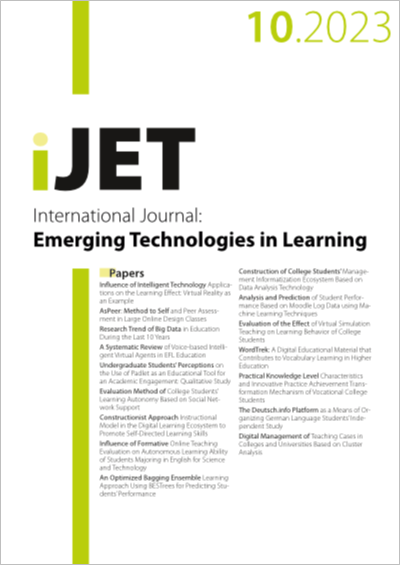Influence of Formative Online Teaching Evaluation on Autonomous Learning Ability of Students Majoring in English for Science and Technology
DOI:
https://doi.org/10.3991/ijet.v18i10.39399Keywords:
Online learning, Formative evaluation, English for science and technology, Autonomous learning ability, Self-efficacy, Moderating effectAbstract
The rapid development of information technology has accelerated the process of educational informatization, the level of which has also been significantly elevated. New teaching informatization modes, such as mobile terminal and online learning, can meet learners’ trans-time-and-space and personalized learning needs. As the main form of teaching evaluation, formative evaluation can provide students with timely and efficient feedback, change teachers’ teaching progress, effectively improve the teaching effect and students’ learning effect, and comprehensively promote students’ autonomous learning ability. In this study, undergraduate students majoring in English for Science and Technology (EST) in five universities of science and engineering in Xi'an city of China, were chosen as research object to explore the influence of formative evaluation (self-evaluation, peer review, and teacher evaluation) on students’ autonomous learning ability in online learning. Thereafter, the moderating effect of self-efficacy on the influence of formative evaluation on students’ autonomous learning ability was analyzed. Results showed that the Cronbach’s α coefficient value of the questionnaire designed in this study was 0.852 and the KMO value was 0.831, indicating its excellent reliability and validity. Evidently, self-evaluation and teacher evaluation can promote the improvement of autonomous learning ability. Self-efficacy plays a moderating role in the promoting effect of formative evaluation on autonomous learning ability. The effect of formative evaluation on autonomous learning ability varies significantly with its frequency of use. Conclusions in this study are of significant reference values for improving the teaching quality of EST through formative evaluation, enhancing the enthusiasm and motivation of college students, and improving the online classroom evaluation system.
Downloads
Published
How to Cite
Issue
Section
License
Copyright (c) 2023 Xuehua Sun

This work is licensed under a Creative Commons Attribution 4.0 International License.



